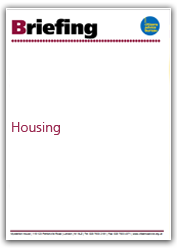Let down
On this page

CAB evidence on letting agents and their charges
Summary
For many people looking for somewhere to live, the private rented sector is their first and, for an increasing number, their only option: home ownership is financially out of reach and the demand for social housing far outstrips supply. As the recession bites, even more people are finding themselves in this situation as repossessed home owners are forced to rent instead, would-be first time buyers are unable to get mortgages, and government plans to expand the social housing stock are hit by the collapse in the house building programme.
Around three million households live in the private rented sector and the majority (60%) of private rented homes are now let via an agent rather than directly from the landlord. The recession is likely to make this more common as home owners who cannot afford their mortgage or who need to move and are unable to sell, become “reluctant landlords” who then choose to engage an agent to let and manage their property rather than do it themselves.
Letting agencies are becoming more powerful in the market for private rented accommodation but are not subject to positive statutory regulation governing their prices or service quality. Anyone can set themselves up as a letting agency, without the need for professional expertise or experience, any requirements about how they hold and manage the steady stream of money they handle between tenants and landlord, or any redress scheme for when things go wrong.
The consequence of this is that too many tenants are let down by the service they receive from their agent. This report details the tenant detriment which stems from this lack of regulation. It also focuses on the widespread practice of imposing often substantial additional charges on tenants for services which are simply part of the routine process of letting and managing a property and should therefore be covered by the rent the tenant pays.
It calls for urgent action by Government to introduce statutory regulation of letting agents, to protect the interests of both tenants and landlords. This must include measures to prevent agents from imposing charges on tenants in addition to the rent.
Key points
The absence of any statutory regulation of letting agents means that using an agent can be a costly and risky business for tenants.
An online survey of 1,330 tenants who visited the Citizens Advice website over a three month period, found that 73% were dissatisfied with the service provided by their letting agent.
Common concerns included difficulties in contacting the agent, serious delays in getting repairs carried out, inadequacies in the protection of clients’ money and the frequency with which additional charges were made.
A survey of 424 letting agents found that 94% imposed additional charges on tenants on top of the tenancy deposit and rent/rent in advance. There was huge variation in the size of these charges. The charge for checking references ranged from £10 to £275 and the charge for renewing a tenancy ranged from £12 to £200. In some cases additional charges for a tenancy amounted to over £600.
Less than a third of agents willingly provided full written details of their charges to CAB workers when asked
Sixty one per cent of the tenants in the survey said that paying these charges was a problem. Some had to borrow the money, others had difficulty paying other bills or went into debt.
More than a quarter of the agents said they did not let to tenants in receipt of housing benefit – a figure which rose to 48% in the south east.
This report calls for the statutory regulation of letting agents. In order to obtain a licence, agents should be required to demonstrate professional competence, have adequate client money protection arrangements and operate a system for handling complaints and redress.
Regulations should also specify that no additional charges should be made to tenants for activities which are part of the routine letting and management process. The cost of this work should be included in the rent paid by the tenant and/or the management fee paid by the landlord.
The regulator must take a pro-active approach to compliance and should have an appropriate range of regulatory tools to enforce this. The ultimate sanction should be the withdrawal of an agent’s licence to operate.
The Departments of Work and Pensions (DWP) and Communities and Local Government (CLG) should consider how housing benefit reform can address the reluctance of letting agents and landlords to let to tenants in receipt of housing benefit.